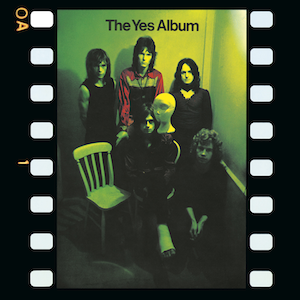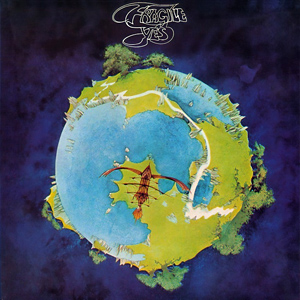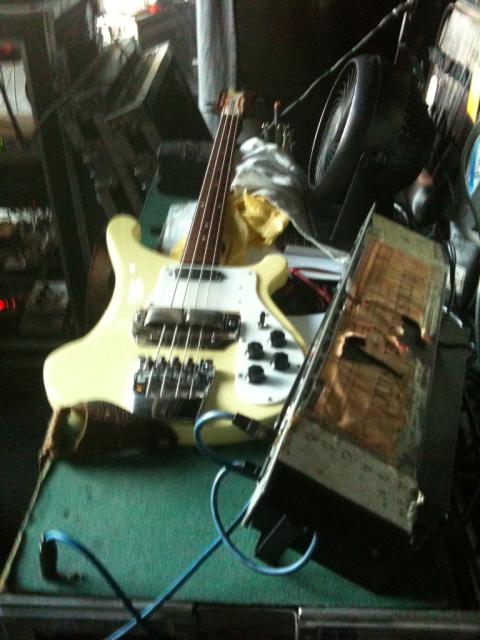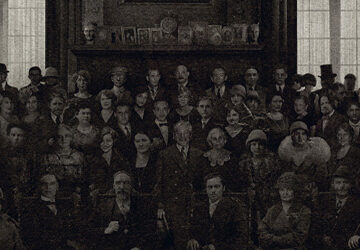
Born Christopher Russell Edward Squire on March 4th, 1948, he started his musical journey as a choirboy until dropping out of school later for refusing to cut his hair to a more respectable length and spending the next several months holed up in his girlfriend’s flat where he developed his unique bass style. With his style starting to solidify, and with the knowledge he gained in the church choir being instrumental in his approach to writing and composing, he cut his teeth with his earliest projects; The Selfs and The Syns, which he formed with Andrew Jackman (drums) and Peter Banks (guitar). Squire would later meet Jon Anderson, and with a shared appreciation for vocal-centric artists like Simon and Garfunkel, they formed Yes, and over the next four and a half decades, would proceed to produce a prolific catalog of Progressive Rock that still continues to inspire musicians to this day.
The exponential ambition from Squire’s first few albums is hard to quantify, but by the time 1971’s The Yes Album hit the shelf, with the virtuosic Steve Howe replacing Peter Banks on guitar, the sophisticated drumming of Bill Bruford, Tony Kaye’s lush keyboards, Jon Anderson’s “elfish,” yet fitting vocals, and, of course the growl of Squire’s bass, the band was reaching a transcendental point with their music and truly creating something completely new. Almost if foreshadowing a similar scenario for another progressive giant, Rush’s 1976 record, 2112, The Yes Album turned out to be a commercial success during a time when the band was at risk of being dropped by their label. The Yes Album has recently been remixed by Steven Wilson (Porcupine Tree).
- Atlantic
- Atlantic
Nineteen seventy-two saw another step forward with the release of Yes’ Fragile. Replacing Tony Kaye, keyboardist, Rick Wakeman would step up (wearing a fabulous, sparkling cape no less) and create an even more ethereal presence to their sound. Fragile also contains one of the most identifiable bass riffs in the history of Rock within the song “Long Distance.” Squire’s greasy bass lines roil underneath the jewel-like notes from Steve Howe until the song fades into the artificial harmonics of “The Fish” (Fish being a nickname given to Squire during his early musical years) — overdriven and using a wah, Squire proved that bass can take a lead role just fine within the context of Rock. Fragile was also the beginning of a long-time relationship with artist Roger Dean designing the album cover.
With a huge catalog and several lineup changes, Chris Squire has been the only constant in Yes. While the sound evolved and the band experimented with commercial Pop, as seen with their massive hit “Owner of a Lonely Heart,” from 1983’s 90125, Jazz/Fusion with Relayer in 1974, and Christian conceptualism, Tales From a Topographic Ocean in 1973, one cannot pay proper tribute to Chris Squire without spending some time to reverently praise what may be considered the most important album in Progressive Rock; that album is 1972’s Close to the Edge. Three songs, thirty-eight minutes, with one side consisting of the eighteen minute title track that, to this day, serves as one of the main blueprints for modern day Prog. After the brief intro of nature sounds and ambient synths on the song “Close to the Edge,” the listener is abruptly slapped with some abstract, Jazzy interplay between Squire, Wakeman, Bruford, Howe, and Anderson’s harmonized scatting. The bass lines in the verse section of “Close to the Edge” contain some of Squire’s most earthy, visceral, and elastic playing in his career; it is like getting one’s intestines stretched out, then tickled — in a good way. The title track and the two remaining songs, “And You and I” along with “Siberian Khatru,” cover every mood, peak, and valley as well as being flawlessly executed and arranged.
- Atlantic
- Atlantic
While solo albums were few and far between, Chris Squire released the brilliant Fish Out of Water in 1975 during a period of downtime with Yes. Squire showed that beyond being a formidable bassist, he was also very capable of handling all lead vocals as well. Employing the talents of Bill Bruford (drums), former Yes member Andrew Jackman (Keys and arrangements), and future Yes keyboardist, Patrick Moraz. The album had a heavy symphonic element to it punctuated by Squires sinuous overdriven bass lines. The opening track, “Hold Out Your Hand,” gives a nod to Squire’s days as a choirboy with a pipe organ intro played by Barry Rose at the St. Paul’s Cathedral in London. Squire would not release another solo album until 2007 with Chris Squire’s Swiss Choir.
- Yes NYCB Theatre at Westbury, NY 7-12-14
One could say that, without Chris Squire, there would be no bass heroes in Rock and Roll today. From Steve Harris (Iron Maiden), John Myung (Dream Theater), Cliff Burton (Metallica), Billy Sheehan (Talas, David Lee Roth, Mr. Big), and Geddy Lee (Rush), each of them (and many others) employ at least one or more techniques that Squire can be credited for developing. He is one of the few, if not the only, bass players who play with a pick that have been embraced and revered on equal ground among the world’s greatest bassists. Not many people will argue that, when it came to bass, Chris Squire was probably the first to bring the treble to the table.
Much like his bass playing, Squire, as person, could be both subtle, with a low-key signature “British” wit, and at times, project a larger-than-life personality, known for driving insanely fast to gigs, much to the discomfort of early Yes drummer Bill Buford. He could, at times, be a brutal perfectionist, hearing even the slightest off color note. This was not out of malice, but out of passion for the music. Many of the memories from those who have shared a musical space with Squire, revolve around his punctuality — or lack thereof — creating the kind of tense situations where, at the time, caused more than one anxiety attack, but afterwards, are looked back upon fondly and with a smile. Even his wife, Scotland Squire, mentions that he may be running a bit behind for his own cremation, and that he has “… always been the ‘late’ Chris Squire.” With that said, Chris Squire’s impact on others and the history of Rock-n-Roll will resonate for eternity.
- Yes NYCB Theatre at Westbury, NY 7-12-14
Chris Squire’s influence reaches far and wide. Read some thought from those he has inspired:
“Chris was the king of the bass. All of Genesis loved his sound. He was a tremendous powerhouse and turned the bass into a lead instrument. Chris was also a great friend and I will always miss him.” – Steve Hackett, former Genesis guitarist
“So sad to hear of the passing of the legend Chris Squire. That sound of his pluck hitting the strings on his Rickenbacker undeniably made him an original and helped shape the way many, many bassists play; myself included. What an amazing legacy of music he has left us. We can never thank you enough Chris. Rest in peace.” – Joey Vera, Armored Saint & Fates Warning bassist
“Very Sad to hear of Chris’ passing. Along with John Entwhistle of the Who, Chris was at the top of my list of Great British Bass Players. His sound was powerful, unique, and he along with Entwhistle, and to some degree Jack Bruce, brought the bass out to the front of the mix. It was an honor for Styx to share the stage with Chris and Yes in 2011 as we toured across North America. I cannot say I got to know him well, but it was incredible to hear him every night up close and personal. His hands were so strong that when he high-fived me on stage on the last night of our 2011 tour, he nearly took my hand off..!! He will be missed.” – James V. “J.Y.” Young, Styx guitarist
“One evening many years ago, I was in a friends car and he had just bought the new Yes album Fragile. The song “Long Distance Runaround” was playing. I was stunned at first. I didn’t really know what to think. Do I like it? I think so … play it again. This bass guitar was not politely thumping along in the sub sonic world where it belonged. It was aggressively in my face demanding me to listen and I better fucking like it. My narrow thought about bass guitar and it’s proper placement in Rock music was changed forever in that instant. Thank you Chris Squire. You’re playing didn’t just change my thought, it changed the music world. RIP.” – Richard Williams, Kansas guitarist
“I was his publicist for a year about four years ago and I loved that man. He was just amazing to work for – a gentle giant.” – Nancy B. Sayle, Publicist V.Q. PR
“Chris Squire was an absolute inspiration to me as a young bass player. But that’s not what’s really important. By the time I’d discovered Yes’ music as a Prog-hungry teenager, I was already doing everything I could with as much time as I had in a day to improve my playing. What Yes, and more importantly, Chris Squire imprinted on me was that being a good player wasn’t all there was to it. Here was a guy who had it all; the chops, the tone, the voice, the stage presence, and all along he never let go of the fundamentals: keep the music together. Rest in peace Chris, thank you for inspiring me, and countless others, to be all you can be for your band.” – Adam Biggs Rivers of Nihil, bassist/vocalist
“The first time I met Chris I told him I was sure I owed him for being such an influence on my playing. He thrust his palm forward and said, “Well pay up!” When I was about 18, I heard he had whittled down an English coin into a pick as part of his sound and I immediately made an attempt to do the same. It forced me to develop my pick playing and not just rely on my fingers. I was fortunate enough to tour with Yes a few years back and I truly enjoyed my conversations with Chris. One day he asked me a few questions about my gear and what I was running through. Well, that opened the flood gates for me to fire back with twice as many questions about his rig and how he got his sound. I’ll always have that as a cherished memory. Thank you Chris. You’ll always be fondly remembered and revered.” – Rick Phillips, Styx bassist
“I’ve always been a prog rocker, and Yes was one of the hen’s-teeth-few of such artists to actually make it into the mainstream musical consciousness. And always at their heart, the powerful, springy bass guitar mastery of Chris Squire took center stage without drawing due attention to itself. squire was an amazing musician, composer, and performer. I was struck by his intellect and lack of bullshit when I interviewed the band in the seventies, and blown away at how he held the band into contemporary power when I saw them a couple of years ago. Squire was a seminal figure in a vastly underrated branch of pop music, and will be greatly missed.” – Mick Garris, filmmaker (Masters of Horror, Hocus Pocus 1993)
“It’s always heartbreaking when we lose someone as overwhelmingly influential and inspirational as Chris Squire. But his bold colorful voice as a bass player, his unique contribution to music, and his legacy will live on forever. He’ll truly be missed, definitely by our band, and certainly by the music loving world as a whole.” – Dave Beste, Rival Sons bassist
“I took this photo (it appears fuzzy due to a shaky photographer) of Chris Squire’s bass as it lay side stage awaiting his hands during our tour with YES in 2011. Standing alone next to Chris’ bass that day I stared at it a long time realizing how much I revered him and this relic. Since I was a teenager dreaming of a life in music, all the wondrous magic he’d conjured from this instrument had made such an impact on my life! Thank you Chris Squire. May your music live forever!” – Lawrence Gowan, Styx vocalist/keyboardist












No comment